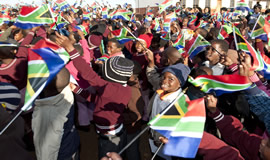
By Mr Kingsley Makhubela, Brand South Africa CEO
2016 is proving to be a very exciting and challenging year for our young democracy. The events of the first few weeks of this year, presents us as a nation with the impetus to assess our 22 years of democracy within the context of the country we will bequeath to our future generations. Unfolding events are forcing us to analyse the shape and form of our country and the character of our nation.
South Africa has always been a unique country. Our diverse, heterogenous population is one of our country’s strongest assets. This contributes to our warm and welcoming nature as a people. It is this that makes visitors, investors and foreign nationals consider South Africa a home.
Our greatest strength is also equally our biggest challenge. This is the paradox of life.
If I were to use one word to describe the sentiment that is currently prevalent in our country, I would use the word “inclusion”. This is what I think underlies the sentiment characterising the recent events in our country. The student movement is ultimately about inclusion into the mainstream of South African society, their opportunities for inclusion into the formal economic streams of the country. The fractures we are seeing over race relations can also be traced back to our perceptions about our inclusion in this multifaceted and diverse country. The same could be said about many other tensions in our country. Social cohesion and the building of a united nation has to become more than just words.
The Institute of Race Relations at the end of February 2016 released a report entitled Race Relations in South Africa: Reasons for Hope. Having interviewed just under 2 300 citizens from across the racial, economic and social spectrum, the Institute surmises:
“…Far from being hostile towards one another, most South Africans, black and white, occupy a pragmatic middle ground on race relations. White South Africans understand and support the need for redress. Black South Africans do not believe that their white compatriots should be treated as second-class citizens. The overwhelming majority of both groups believe that they need each other for progress to be made.”
This is very contrary to what we see play out in mainstream and social media platforms.
The Report however makes it clear that “The inequalities that still exist need urgently to be addressed by people working together to encourage investment, stimulate growth, improve education, and generate millions more jobs”.
This sentiment is echoed in the recently released South African Reconciliation Barometer Briefing Paper titled Perceptions of Economic Security and Well Being which found that “61% [of the respondents] noted that any attempt at national reconciliation will remain futile for as long as those who were disadvantaged under apartheid remain poor. These findings underscore the fact that perceptions about economic security and the distribution of wealth continue to play a critical role in deciding our success or failure in creating a united South African nation”.
Again we can see the thread of the need for all citizens to be included in the mainstream and formal social economic sphere in our country. While this may be something that we have all observed and taken note of, I must caution that for a sense of inclusion to permeate our country at all levels, it will take more than just government interventions through legislation, policies and frameworks. It will take more than politicians calling on South Africans to act against current inequalities in our country.
We all have a role to play in ensuring that South Africa becomes a socially cohesive country united under a single flag. Legislation and policies cannot change my attitude about how I treat another citizen. It cannot force me to treat my fellow citizens with respect, dignity and courtesy. This is something that I must take responsibility for. It is something that I must consciously change.
South Africa has recognised the urgent need for economic growth and development to be prioritised in the country. The Minister of Finance Pravin Gordhan in the 2016 Budget Speech spoke about reigniting the economy. He equally spoke without equivocation about the resilience of the South African nation.
Our resilience as a nation must equally be characterised by our agility to respond differently to the persistent challenges of inequality and underdevelopment. It is such a spirit and national ethos which will see us chip away at the stubborn sense of exclusion that is currently prevalent in our society. I believe it is such a change in the psyche of our nation which will make the most difference to whether we become a socially cohesive citizenry. – SAnews.gov.za


